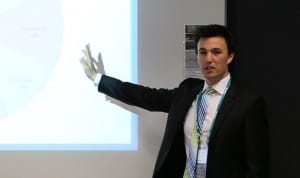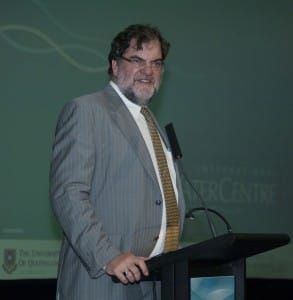Taking it to the top: influencing policy and decision-making
An important factor in achieving water sensitive cities is the introduction of novel technologies and practices to improve established ways of managing water in urban environments. The success of this endeavour hinges on constructive communication between scientists and industry practitioners to create innovative solutions, and then further communication of those solutions to policy and decision makers who need to be convinced of their value. Often this is not an easy process. While those in the political arena look for opportunity and compromise, scientists and industry practitioners want to see new technologies or processes applied in full to ensure maximum success. So how can these different agendas be accommodated to achieve sustainable water management?
Talk to the pollies
One clever approach of the CRC for Water Sensitive Cities (CRCWSC) has been to canvass the decision-makers. Strategies for influencing the political dynamics of decision-making (Project A3.3) comprises a team with broad political backgrounds, including Professor John Thwaites, former Victorian Deputy Premier and Environment Minister. While the team’s initial brief was to determine how best to prepare politicians for interactions with water management practitioners, it soon became apparent that this was not the right approach – rather, the onus needed to be on the practitioners and researchers to understand the political process and how to influence outcomes.


Pitch your point
“Scientists are traditionally not good at thinking about how to get their science ‘out there’ and into the political arena. To succeed, it is important that they market their science with at least an eye toward its political application,” says Dr Matt Laing, a political scientist and Monash University Research Fellow exploring water decision-making processes through case studies in Victoria, Queensland, and Western Australia. The case studies consist of interviews with target groups in water reform and management, including practitioners, implementers, researchers, policy advisers, and ministers. Early findings have shown that policy makers credit scientists with little influence on policy development. Examining the number of times that relevant Queensland ministers – with portfolios including Water, Industries, or Primary Resources – met with industry representatives and interest groups over the course of a year revealed that scientists were the second smallest group of all to engage with politicians and to advocate for their interests. Conversely, interviews with 30 key players in water policy reform showed that researchers who were better attuned to political messaging and pitching their agendas seemed to be most influential in achieving policy outcomes.
Keep it simple
One important element of successful advocacy is the need to explain technical concepts in plain English with a minimum of jargon, and to highlight any political opportunities that could come from implementing novel approaches. Timing and preparation are of the essence: political opportunities to pitch water reform can arise suddenly – such as when drought events result in urban water shortages – and responses from researchers and practitioners must be to hand when they do.
Work it
With smart communication being a critical element in influencing decision-making, networks of “political champions” can help to amplify messages. Well-informed and savvy individuals operating across research, industry, and government can form powerful alliances that succeed more often than individuals alone. But even champions rely on coordinated strategies for maximum impact.
Matt sees this as a role that the CRCWSC is well placed to facilitate: “One of the CRCWSC’s current challenges is that many of our projects are led by academics who have been relatively cloistered in their research environments and are inexperienced at coordinating different agendas or recognising political opportunities,” he explains. “Placing more politically savvy CRCWSC stakeholders at the helm could produce useful guidance for both researchers and practitioners engaged in these projects.”
The importance to researchers of networking and clear communication is echoed by Mark Pascoe, Chief Executive Officer of the International WaterCentre (a participant in the CRCWSC): “Networks are created for different reasons: to expand knowledge, provide insights into different agendas, and to determine how best to influence them.”
Abandon your comfort zone
Mark emphasises the value of drawing researchers out of their comfort zones to engage with other water management industry stakeholders and understand their perspectives. His own current position – influencing water-reform politics – benefits greatly from his previous management roles in water-treatment plants, and his past presidency of the Australian Water Association. Networking to bridge the gap between researchers and government are core parts of his current role.
“Technical innovation is only a small piece of the water-management puzzle – most change is brought about by players well outside of the academic sphere and that’s where the conversations have to take place. The most effective way of encouraging new practices is to network with and influence players such as the departments responsible for housing and roads, as well as developers and consultants advising architects.”
One approach to building such networks would be to establish “communities of practice” for design of water sensitive cities, centred on developers rather than water engineers. This has been mooted during CRCWSC discussions in the past, and its implementation could speed up water management reform considerably, according to Mark (pictured below).

Communicate, communicate, communicate
An important aspect of successful negotiations is the ability to respond quickly to changing circumstances. Generating new iterations of concepts and ideas ensures that negotiations between water-project stakeholders don’t stall. This is an area where Mark sees the traditionally slow and thorough approach of science to be somewhat at odds with real-world requirements. In his experience, research would benefit from quicker response times and greater flexibility to produce better water outcomes. But the need for faster change is not limited to academia. Local governments, often inherently resistant to change, also need encouragement and good information to help manage the risk and speed up their internal decision-making processes. Once again, effective communication (preferably visual) and demonstration of concepts (such as plant-based water filtration systems) are the key to helping governments adopt new practices.
“In the past, we have built cities to last 100 years, but research and the water-reform agenda are now challenging that thinking. The change required is considerable and we have to aim to make it as easy as possible for all relevant players.”
Nicola Markus for the Mind Your Way Team